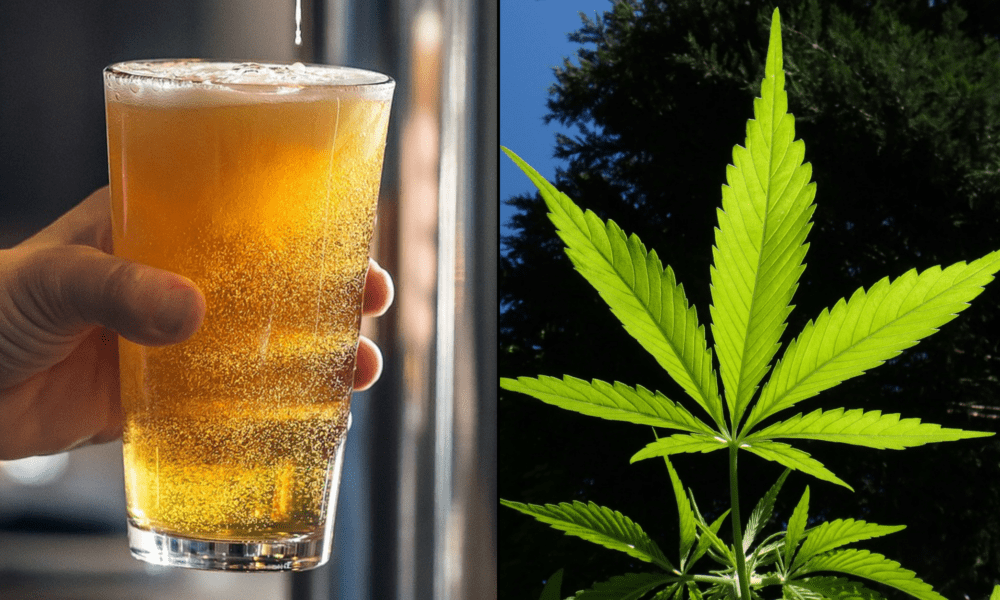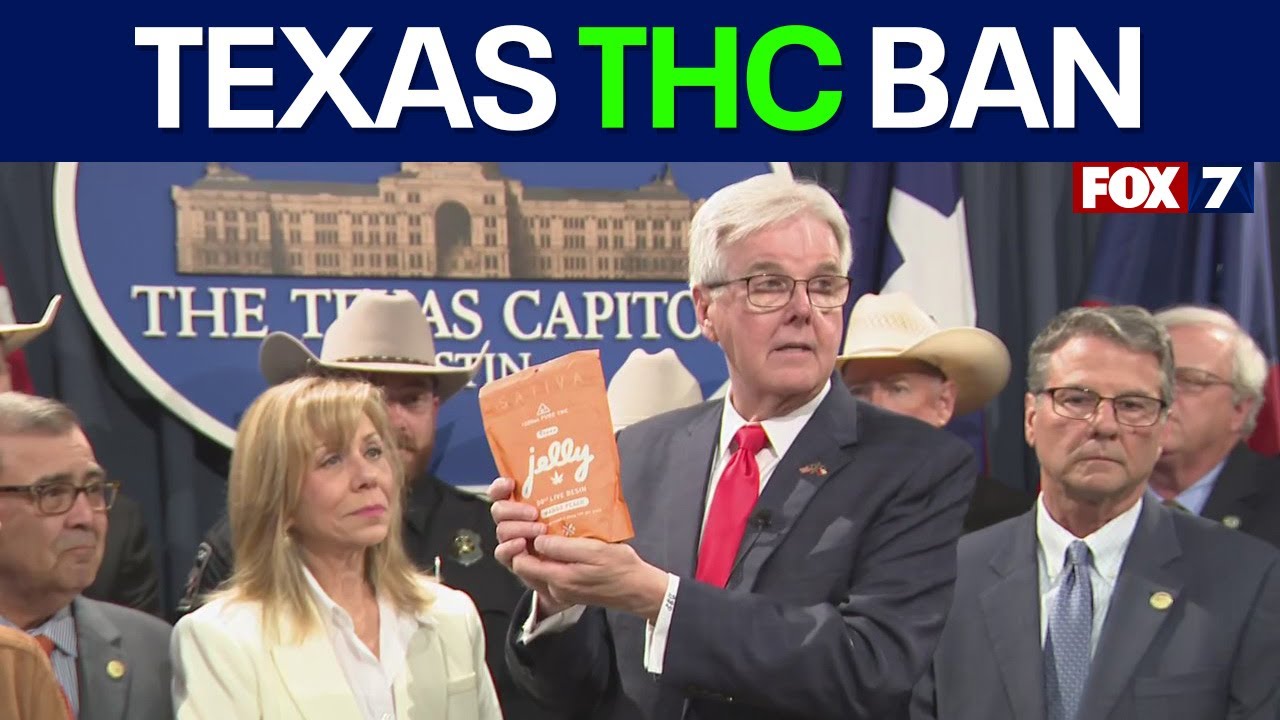featured
CBD From Cannabis Could Help Reduce Alcohol Binge Drinking, Study Shows
Published
12 hours agoon

The cannabinoid CBD reduces rates of binge drinking and alcohol blood concentrations, a new study of mice indicates.
Using what they called a “murine drinking-in-the-dark” research model, scientists at the University of Sydney investigated the theory that non-intoxicating cannabidiol could mitigate problematic drinking issues.
“These experiments consistently showed a dose-dependent suppression of alcohol consumption by CBD,” the paper concludes. “The efficacy of acute CBD persisted for several months, was maintained during sub-chronic administration and was not associated with locomotor impairments.”
The study, published in the journal British Journal of Pharmacology with funding from the Australian National Health and Medical Research Council, found that “CBD represents a promising candidate to reduce voluntary alcohol consumption.”
“Mechanisms driving CBD’s alcohol-related effects remain unclear and may involve polypharmacology, including actions at the [neuropeptide S receptor] identified in the present study,” researchers said.
“The present findings showed a clear, dose-dependent inhibition by CBD of binge-like ethanol consumption in male and female mice. This effect was supported by [blood ethanol concentration] data and could not be attributed to sedation, because CBD did not alter locomotor activity. CBD suppressed drinking with acute administration, and the effect was maintained when CBD was administered sub-chronically, indicating the effect was not subject to tolerance.”
“CBD presents as a promising novel pharmacotherapy for problematic alcohol use; however, how CBD generates alcohol-related benefits is yet to be determined,” the study says. “Unravelling CBD’s mechanisms may direct the development of safer, more effective [alcohol use disorder] therapeutics.”
Results of a separate study published in the journal Molecular Psychiatry also indicated that a single, 800-milligram dose of CBD can help manage certain alcohol cravings among people with alcohol use disorder (AUD), supporting the use of the marijuana component as a potential treatment option for problem drinkers.
Federally funded research into the effects of cannabis on alcohol use that was published last month also found that people who used marijuana immediately before drinking subsequently consumed fewer alcoholic beverages and reported lower cravings for alcohol.
The study follows a separate survey analysis published in March that found that three in four young adults reported substituting cannabis for alcohol at least once per week—a “fast-emerging” trend that reflects the “rapid expansion” of the hemp product marketplace.
The report from Bloomberg Intelligence (BI) found that, across various demographics, cannabis is increasingly being used as an alternative to alcohol and even non-alcoholic beverages as more companies—including major multi-state marijuana operators (MSOs)—expand their offerings.
The findings were largely consist with a growing body of studies indicating that cannabis—whether federally legal hemp or still-prohibited marijuana—is being utilized as a substitute for many Americans amid the reform movement.
An earlier survey from YouGov, for example, found that a majority of Americans believe regular alcohol consumption is more harmful than regular marijuana use. Even so, more adults said they personally prefer drinking alcohol to consuming cannabis despite the health risks.
A separate poll released in January determined that more than half of marijuana consumers say they drink less alcohol, or none at all, after using cannabis.
Yet another survey—which was supported by the National Institute on Drug Abuse (NIDA) and released in December—found that young adults are nearly three times more likely to use marijuana than alcohol on a daily or near-daily basis.
That poll provided more granular, age-specific findings than a similar report published last year, finding that more Americans overall smoke marijuana on a daily basis than drink alcohol every day—and that alcohol drinkers are more likely to say they would benefit from limiting their use than cannabis consumers are.
A separate study published in the journal Addiction last year similarly found that there are more U.S. adults who use marijuana daily than who drink alcohol every day.
In December, BI also published the results of a survey indicating that substitution of cannabis for alcohol is “soaring” as the state-level legalization movement expands and relative perceptions of harm shift. A significant portion of Americans also said in that poll that they substitute marijuana for cigarettes and painkillers.
Another BI analysis from last September projected that the expansion of the marijuana legalization movement will continue to post a “significant threat” to the alcohol industry, citing survey data that suggests more people are using cannabis as a substitute for alcoholic beverages such a beer and wine.
Yet another study on the impact of marijuana consumption on people’s use of other drugs that was released in December suggested that, for many, cannabis may act as a less-dangerous substitute, allowing people to reduce their intake of substances such as alcohol, methamphetamine and opioids like morphine.
A study out of Canada, where marijuana is federally legal, found that legalization was “associated with a decline in beer sales,” suggesting a substitution effect.
The analyses comport with other recent survey data that more broadly looked at American views on marijuana versus alcohol. For example, a Gallup survey found that respondents view cannabis as less harmful than alcohol, tobacco and nicotine vapes—and more adults now smoke cannabis than smoke cigarettes.
A separate survey released by the American Psychiatric Association (APA) and Morning Consult last June also found that Americans consider marijuana to be significantly less dangerous than cigarettes, alcohol and opioids—and they say cannabis is less addictive than each of those substances, as well as technology.
Meanwhile, a leading alcohol industry association is calling on Congress to dial back language in a House committee-approved spending bill that would ban most consumable hemp products, instead proposing to maintain the legalization of naturally derived cannabinoids from the crop and only prohibit synthetic items.

Author: mscannabiz.com
MScannaBIZ for all you Mississippi Cannabis News and Information.
You may like
-


Texas Military Veterans Say Potential Ban On Hemp-Derived THC Could Drive Them Back To Opioids Or The Illicit Marijuana Market
-


Fluence Debuts SPYDR 3: Pioneering Fixture Upgrades Output and Efficiency for Cannabis Growers
-


Maine Credit Union Dropping Medical Cannabis Caregiver Accounts
-


Iowa Lawmaker Surprised By Governor’s ‘Unexpected’ Veto Of Psilocybin Bill
-


How To Avoid Post Cannabis Grogginess
-


Minnesota Adult-Use Dispensary Island Peži Celebrates 1st Anniversary
featured
Texas Military Veterans Say Potential Ban On Hemp-Derived THC Could Drive Them Back To Opioids Or The Illicit Marijuana Market
Published
10 minutes agoon
June 18, 2025
“The doctor assured me he could prescribe me enough… I said, ‘Sure, you can, but I can’t afford it.’”
By Hayden Betts and Stephen Simpson, The Texas Tribune
Wesley Barnes, 55, a Gulf War veteran, has battled chronic pain and PTSD since his exposure to sarin gas overseas. After leaving the Army in 1994, he spent years dependent on prescribed opiates.
“There’s really nothing at the VA to help with pain or anxiety that isn’t addictive,” said Barnes from his home in Onalaska, about 30 miles east of Huntsville. “I was a zombie on a couch.”
Barnes qualified for Texas’s medical marijuana program, also called the Compassionate Use Program, shortly after its expansion in 2021. He paid $600 in doctor’s visits to sign up, and he paid another $600 to $800 a month to buy legal medical cannabis.
“The doctor assured me he could prescribe me enough,” Barnes recalled. “I said, ‘Sure, you can, but I can’t afford it.’”
Barnes briefly turned to purchasing cannabis illegally before discovering he could treat his pain with legal hemp products. He could buy for $40 what cost him $220 on the street.
“Don’t make me go back to the black market,” Barnes said.
Now, as Texas looks to ban hemp products while expanding the state’s medical marijuana program, some chronic pain patients like Barnes say they do not plan to participate in the Compassionate Use Program even if retail THC products become illegal. Their concerns center on the high cost, dosing inflexibility and civil rights issues raised by the legal alternative.
Gov. Greg Abbott’s (R) veto is the last remaining hurdle for a bill that would ban all products containing tetrahydrocannabinol, or THC, likely spelling the end for the state’s short-lived hemp industry.
Senate Bill 3, which prohibits the possession of consumable hemp products that contain any synthetic cannabinoid, often known as delta-8, was a priority this legislative session for Lt. Gov. Dan Patrick (R), who often denounced the effects of the drug on children. Patrick did not respond to The Texas Tribune’s requests for a comment.
Hemp users, retailers, growers and some Republicans have been urging Abbott to axe the bill. Asked whether Abbott would veto SB 3 by the June 22 deadline, his press secretary Andrew Mahaleris said the governor is still reviewing all pending legislation.
As a concession of sorts to veterans and THC users with chronic conditions, House Bill 46 also passed this legislative session, expanding the types of products, number of dispensaries and qualifying health conditions for the medical marijuana program, as well as reducing some of the costly regulations on dispensaries.
Jervonne Singletary, a spokesperson for Austin medical marijuana company Goodblend, said the new rules should translate into lower prices for customers.
“With any limited program at the start, it’s expensive, and then when it slowly expands overtime, and more locations come online, and more operators come online, more cultivation spaces come online, then naturally the prices of the medicine come down,” she said.
Accessibility of hemp-derived THC
William Macbrohn, a 57-year-old Air Force veteran living in San Antonio, worked as a warehouse manager at Habitat for Humanity until psoriatic arthritis prevented him from doing his job.
“I’m in pain 24/7. On a good day, I’m at a five or a six. I mow the lawn and I’m done for two days,” Macbrohn said.
Macbrohn only uses consumable hemp products at night to help ease his pain enough to fall asleep. He found them after years of searching for a product that he believed was neither physically addictive nor had unpredictable mental effects like Ambien.
“Finally, all this time that I’ve been suffering, I found something that’ll help that’s not a synthetic chemical…and they’re going to go and take it away,” he said.
Macbrohn qualifies for the state’s Compassionate Use Program but has avoided signing up for it because he regularly carries a concealed gun. He believes carrying a weapon and having a medical marijuana card would be illegal under federal law, though not Texas law. “I don’t want to take that chance,” said Macbrohn, who believes concealed-carrying and using consumable hemp while it’s still legal is permissible.
The issue of the federal legality of both using state-level legal marijuana and owning a gun remains a gray area nationwide. The 2021 case of an El Paso woman convicted of federal crimes for both owning firearms and illegally possessing marijuana was overturned by the Fifth Circuit Court of Appeals in January as “inconsistent with our history and tradition of firearms regulations.” However, the U.S. Department of Justice has appealed cases with similar facts to the Supreme Court, which has yet to rule on the issue broadly.
Macbrohn’s commitment to abiding by the law extends to the potential hemp ban. Possessing consumable hemp products under the bill would be an expungeable Class C misdemeanor punishable with a fine up to $500 and no jail time.
“If they ban it, then I guess I’m done,” he said.
For the time being, Macbrohn is stockpiling consumable hemp products.
Donna Maniscalco, a 62-year-old Navy veteran living in Lometa, served nearly 19 years as a chaplain’s assistant before being discharged for medical reasons in 2009. Stationed for a time in Keflavik, Iceland, where she was repeatedly “picked up by the wind and just literally thrown,” she developed spinal injuries that surgeons have declined to operate on.
Maniscalco says that consumable hemp products allow her to maintain a normal lifestyle and to garden, which helps her mental health. Without them, she’d “probably be in bed all day.”
Maniscalco, like Macbrohn, is also concerned that putting her name on a list could infringe on her right to carry a firearm.
Maniscalco said that if the ban goes into effect she may move in with her parents who live in upstate New York where cannabis and consumable hemp products are widely legal and available.
“I don’t want to go,” she said, “I have friends here. I have two sons and a daughter here. I love the long growing season. I love Texas.”
Barnes said among the allures of hemp products is that they come in different strains that create an ultra-personalized treatment option. Meanwhile, with the medical marijuana program, doctors are prohibited from prescribing cannabis doses higher than 10 milligrams at a time, forcing “the price higher for someone who has more pain,” Barnes said.
Can medical marijuana expand quickly enough?
HB 46 expands the state’s medical marijuana program by including more popular products such as prescribed inhalers and vaping devices and adding nine dispensers to bring the total to 12. It also adds traumatic brain injuries, chronic pain, Crohn’s disease and terminal illnesses to the list of qualifying conditions.
But the bill’s biggest change that could lower prices for consumers will be allowing medical marijuana distributors to store their products in various satellite locations instead of having to drive across the state to return the product to the original dispensary every day.
This has made products more expensive and limited where the medical marijuana program can reach.
Singletary said prices should decline now that medical marijuana companies can stock products overnight in designated locations.
But, she clarified she doesn’t expect medical marijuana to be as accessible as hemp immediately. More than 8,000 retailers in Texas now sell hemp-derived THC products. Before starting the expansion process, the medical marijuana industry will need a few months after the law goes into effect on September 1 to clarify some of the technical details of the new legislation, Singletary said.
“Hemp exploded overnight,” she said, “but we are going to have measured growth.”
While hemp might become illegal in Texas, it still will be federally legal, meaning mail-order hemp products will still be an option for some, but Singletary said she doesn’t feel the need to compete with this industry.
“There are millions of Texans who want quality, regulated products in the state and don’t want to trust mail-order hemp, so the folks who feel like that is the option for them, I respect their decision, I truly do, but those who want doctor prescribed cannabis that’s produced in the state that is regulated, tested, and validated, then come to our program,” she said.
Regulation versus a ban
Since the wave of recreational marijuana legalization began with Colorado and Washington in 2012, large scale studies have repeatedly found that marijuana use in general increases when cannabis is legal. Other studies have shown that use decreases when cannabis becomes criminalized, suggesting Texas will likely follow a similar path despite some users saying they plan on circumventing the THC ban.
For more than a century, government officials and public health experts have debated the efficacy of cannabis prohibition in achieving a variety of aims.
Civil rights attorneys argue that drug criminalization comes with a civil liberties cost. A 2020 ACLU report found that “more than six million [marijuana related] arrests occurred between 2010 and 2018” and that “Black people are 3.64 times more likely than white people to be arrested for marijuana possession, notwithstanding comparable usage rates.”
Kirsten Budwine, a policy attorney at the Texas Civil Rights Project, said, “This is not just bad policy, but a step backward into the failed logic of the war on drugs… What it really does is turn a regulatory issue into a criminal one.”
Decades of studies affirm the utility of cannabinoids in treating chronic pain. A 2017 review of over 10,000 studies found “substantial evidence” that cannabinoids are good for treating chronic pain and “moderate evidence” that extensive cannabinoid use impairs memory and attention.
Medical experts agree that incidences of cannabis-induced psychosis like the ones Patrick has referenced in press conferences, do occur, especially when exposing high-THC products to a broad population without safeguards.

Last year, the National Academies of Science, Engineering and Medicine responded to growing concerns about the expansion of cannabis use in the country by calling for unregulated hemp-derived products to be “regulated in the same manner as other intoxicating cannabis products” at the federal level. The report also called for public education campaigns about the risks of cannabis and for states to prevent underaged people from buying the drug, rather than outright policy bans of THC products or the criminalization of cannabis possession.
Users and the hemp industry had told Texas lawmakers that they would welcome regulations to the hemp industry to address those concerns, rather than a complete ban.
Barnes fears that the new era of illegal hemp could create even more dangers than before.
“Do they want me to have to go back to some guy on the street corner and hope it doesn’t have fentanyl in it? Or get shot for 200 bucks or whatever?” he said.
This article originally appeared in The Texas Tribune at https://www.texastribune.org/2025/06/17/texas-thc-hemp-medical-marijuana-ban-veterans-pain/.
The Texas Tribune is a member-supported, nonpartisan newsroom informing and engaging Texans on state politics and policy. Learn more at texastribune.org.
Photo courtesy of Kimzy Nanney.

Author: mscannabiz.com
MScannaBIZ for all you Mississippi Cannabis News and Information.
featured
Fluence Debuts SPYDR 3: Pioneering Fixture Upgrades Output and Efficiency for Cannabis Growers
Published
1 hour agoon
June 18, 2025
[PRESS RELEASE] – AUSTIN, Texas & EINDHOVEN, Netherlands, June 18, 2025 – Fluence, a leading global provider of energy-efficient LED lighting solutions for commercial cannabis production, announced SPYDR 3, the latest generation of the cannabis industry’s pioneering fixture.
SPYDR 3 features the line’s signature design, now with five wattage options that provide exceptional flexibility to growers. With output up to 2,260 μmol/s, efficiency up to 3.0 μmol/J and new spectrum options—including Fluence’s BW4a, BW45 and BW5—SPYDR 3 optimizes energy savings while enabling growers to hit desired light levels.
“Ten years ago, Fluence introduced a transformative luminaire to the cannabis industry that revolutionized indoor cultivation,” said Michiel van Dam, president of Agricultural Lighting at Signify. “Today, SPYDR is the technology of choice for growers seeking maximum yield and quality at the greatest efficiencies in their facilities. With enhanced wattage options, additional research-backed spectra, and versatile sizing, we’re not just meeting growers’ needs—we’re delivering them the lighting technology they need to dominate in their markets.”
The third-generation SPYDR also features an integrated power supply and sealed lens design, providing a cleanable barrier lens to protect it from the cultivation environment. The fixture’s high-light intensity options and substantial efficiencies also support growers seeking rebate incentives.
Learn more about SPYDR 3 or contact the Fluence team about implementing SPYDR at your facility here. For more information on Fluence, visit www.fluence-led.com.

Author: mscannabiz.com
MScannaBIZ for all you Mississippi Cannabis News and Information.
featured
Maine Credit Union Dropping Medical Cannabis Caregiver Accounts
Published
2 hours agoon
June 18, 2025
Maine’s cPort Credit Union is canceling its medical cannabis caregiver storefront accounts due to a lack of state regulations, WMTW reports.
In Maine, caregiver storefronts can legally sell cannabis products to patients, but they are smaller businesses than dispensaries and do not operate within the same licensing structure.
Andrew Pettingill, the owner of Portland-based Evergreen Cannabis Company, told the news station that he received via email a letter from the credit union’s president and CEO, Kelsey Marquis, saying that his business account — and all other unaffiliated caregiver accounts held with the credit union — will be closed on July 31.
“cPort Credit Union has made the difficult decision to discontinue financial services for caregiver accounts that are not affiliated with a licensed cannabis dispensary or adult-use cannabis business. As banking regulatory expectations continue to evolve, we have carefully reassessed our risk exposure and concluded that this change is necessary to ensure ongoing compliance with federal and state expectations.” — Marquis, email excerpt via WMTW
Meanwhile, the Maine Office of Cannabis Policy (OCP) has proposed bills to align the banking regulations for medical cannabis caregivers with those for cannabis license-holders, but lawmakers have repeatedly rejected the proposals, the report said.
“Now they’re saying, OK, we’ll go back to no banks, just put your money in shoeboxes,” Pettingale said in the report.
Get daily cannabis business news updates. Subscribe
Have an additional perspective to share? Send us a message to let us know, and if your comment is chosen by our editors it could be featured here.
Perspective to add? Suggest a revision or submit commentary for review using the form below.
Ganjapreneur is made possible by our partners:

Author: mscannabiz.com
MScannaBIZ for all you Mississippi Cannabis News and Information.

Texas Military Veterans Say Potential Ban On Hemp-Derived THC Could Drive Them Back To Opioids Or The Illicit Marijuana Market

Fluence Debuts SPYDR 3: Pioneering Fixture Upgrades Output and Efficiency for Cannabis Growers

Maine Credit Union Dropping Medical Cannabis Caregiver Accounts

Iowa Lawmaker Surprised By Governor’s ‘Unexpected’ Veto Of Psilocybin Bill

How To Avoid Post Cannabis Grogginess

Minnesota Adult-Use Dispensary Island Peži Celebrates 1st Anniversary

Cannabis consumers unhappy with Trump, poll shows (Newsletter: June 18, 2025)

Marijuana And Drug Groups Press Meta About Shadowbanning And Censorship Of Content On Facebook And Instagram

DEA Museum Highlights Pen That Nixon Used To Sign Modern War On Drugs Into Law

CBD From Cannabis Could Help Reduce Alcohol Binge Drinking, Study Shows

Gen Z Is Ditching Relationship Labels While Millennials

Florida Lawmakers Pass Bill To Revoke Medical Marijuana Cards From People With Drug Convictions, Sending It To DeSantis’s Desk

North Carolina Lawmakers Advance Bill To Regulate Hemp THC Products And Restrict Kratom

Alaska Activists Launch Campaign To Put Psychedelics Legalization Measure On 2026 Ballot

Best dab rigs of 2025 by Leafly

High Times Magazine Acquired for $3.5M by RAW Rolling Papers Owner
Connecticut Man Busted with $8.5M Worth of Shrooms

Mississippi Choctaws to Elect Tribal Council Representatives

Delaware Lawmaker Withdraws Bill To Regulate Hemp-Derived THC Drinks

Mississippi AG Limits Sale of Consumable Hemp Products

Dallas-Area Officers Raid 3 Licensed Hemp Distribution Warehouses in ‘Enforcement Overreach’
The Counterculture Giant Reclaims Its Roots

Study: Daily Cannabis Consumers Exhibit Few Changes in Simulated Driving Performance Compared to Controls

Oregon Officials Will Appeal Court Decision That Overturned Marijuana Industry Labor Peace Law

Alert: Department of Cannabis Control updates data dashboards with full data for 2023

Connecticut Appoints The US’s First Cannabis Ombudsperson – Yes there is a pun in there and I’m Sure Erin Kirk Is Going To Hear It More Than Once!

5 best CBD creams of 2024 by Leafly

Free delta-9 gummies from Bay Smokes

EU initiative begins bid to open access to psychedelic therapies
New Study Analyzes the Effects of THCV, CBD on Weight Loss

Mississippi city official pleads guilty to selling fake CBD products

Curaleaf Start Process Of Getting Their Claws Into The UK’s National Health System – With Former MP (Resigned Today 30/5/24) As The Front Man

May 2024 Leafly HighLight: Pink Runtz strain

Horn Lake denies cannabis dispensary request to allow sale of drug paraphernalia and Sunday sales | News

5 best autoflower seed banks of 2024 by Leafly

Discover New York’s dankest cannabis brands [September 2024]

Press Release: CANNRA Calls for Farm Bill to Clarify Existing State Authority to Regulate Hemp Products

Local medical cannabis dispensary reacts to MSDH pulling Rapid Analytics License – WLBT

Nevada CCB to Accept Applications for Cannabis Establishments in White Pine County – “Only one cultivation and one production license will be awarded in White Pine County”

The Daily Hit: October 2, 2024

6 best CBD gummies of 2024 by Leafly

5 best THC drinks of 2024 by Leafly

5 best delta-9 THC gummies of 2024 by Leafly

Weekly Update: Monday, May 13, 2024 including, New Guide for Renewals & May Board meeting application deadline

People In This State Googled ‘Medical Marijuana’ The Most, Study Shows

PRESS RELEASE : Justice Department Submits Proposed Regulation to Reschedule Marijuana

Press Release: May 9, STIIIZY and Healing Urban Barrios hosted an Expungement Clinic & Second Chance Resource Fair

Thailand: Pro-cannabis advocates rally ahead of the government’s plan to recriminalize the plant
Trending
-

 California Cannabis Updates1 year ago
California Cannabis Updates1 year agoAlert: Department of Cannabis Control updates data dashboards with full data for 2023
-

 Breaking News1 year ago
Breaking News1 year agoConnecticut Appoints The US’s First Cannabis Ombudsperson – Yes there is a pun in there and I’m Sure Erin Kirk Is Going To Hear It More Than Once!
-

 best list11 months ago
best list11 months ago5 best CBD creams of 2024 by Leafly
-

 Bay Smokes12 months ago
Bay Smokes12 months agoFree delta-9 gummies from Bay Smokes
-

 Business9 months ago
Business9 months agoEU initiative begins bid to open access to psychedelic therapies
-

 cbd1 year ago
cbd1 year agoNew Study Analyzes the Effects of THCV, CBD on Weight Loss
-

 Mississippi Cannabis News1 year ago
Mississippi Cannabis News1 year agoMississippi city official pleads guilty to selling fake CBD products
-

 Breaking News1 year ago
Breaking News1 year agoCuraleaf Start Process Of Getting Their Claws Into The UK’s National Health System – With Former MP (Resigned Today 30/5/24) As The Front Man



